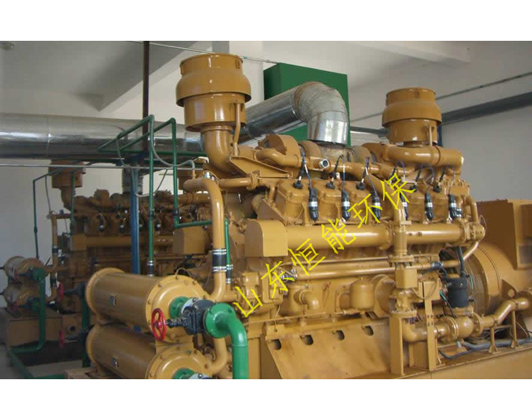沼氣熱電聯(lián)產(chǎn)機組將沼氣作為發(fā)動機燃料,在發(fā)電的同時,將發(fā)動機的尾氣余熱和缸套水余熱進行回收來產(chǎn)生熱水或蒸汽,用來提供生活用熱水或為厭氧發(fā)酵罐供熱水來進一步提高沼氣產(chǎn)量。
The biogas cogeneration unit uses biogas as engine fuel. At the same time of generating electricity, the waste heat of exhaust gas and cylinder liner water are recovered to generate hot water or steam, which can be used to provide hot water for daily use or to heat water for anaerobic fermentation tank to further improve biogas production.
沼氣熱電聯(lián)產(chǎn)機組由沼氣發(fā)動機、交流發(fā)電機、余熱回收系統(tǒng)、控制系統(tǒng)、公共底座等幾部分組成。發(fā)出的電既可自用,也可并入電網(wǎng);沼氣發(fā)動機排出的550~ 600℃的高溫尾氣及80~90℃缸套水,經(jīng)過板式換熱器和尾氣余熱鍋爐等回收系統(tǒng)產(chǎn)生85-90℃熱水,用于生活用熱水、冬季供熱或厭氧發(fā)酵罐的保溫。
The biogas cogeneration unit is composed of biogas engine, alternator, waste heat recovery system, control system and common base. The electricity generated can be used for both self-use and power grid. The high-temperature exhaust gas from the biogas engine at 550-600 C and the cylinder liner water at 80-90 C can generate 85-90 C hot water through plate heat exchangers and waste heat boilers for domestic hot water, winter heating or anaerobic fermentation tank.
1、提高能源綜合利用率,降低能源成本
1. Improving the comprehensive utilization rate of energy and reducing the cost of energy
熱電聯(lián)產(chǎn)系統(tǒng)發(fā)電和產(chǎn)熱效率更高且能顯著降低費用。產(chǎn)生的熱可以完全用于生活熱水或供熱,發(fā)出的電可以用于相關工程現(xiàn)場,多余的電力還可以送到電網(wǎng),這樣一來,既可以有額外的收益,又可以在波動的能源市場上有高度的獨立性。
Cogeneration systems are more efficient in generating electricity and heat and can significantly reduce costs. The heat generated can be used entirely for domestic hot water or heating, the electricity generated can be used for relevant engineering sites, and the surplus electricity can also be sent to the power grid, which can provide additional benefits and high independence in the volatile energy market.

2、降低碳排放,減少環(huán)境污染
2. Reducing Carbon Emission and Environmental Pollution
熱電聯(lián)產(chǎn)機組可以節(jié)約高達40%的一次能源,比傳統(tǒng)發(fā)電方式降低60%的二氧化碳排放。與其他化石燃料相比,燃燒時的二氧化碳排放量更低。
Cogeneration units can save up to 40% of primary energy and reduce carbon dioxide emissions by 60% compared with traditional power generation methods. Compared with other fossil fuels, carbon dioxide emissions from combustion are lower.
3、結構緊湊,空間占用少
3. Compact structure, less space occupation
緊湊的結構讓發(fā)動機的動力和燃燒的熱量高效的轉化為電能和熱能。集成化設計,結構緊湊,布局合理,機組在建筑物中所占的空間也做到小化,同時降低了機組安裝和連接的開支。
The compact structure allows the most efficient conversion of engine power and combustion heat into electrical and thermal energy. Integrated design, compact structure, reasonable layout, the space occupied by units in the building is minimized, while reducing the cost of installation and connection of units.
4、智能控制,操作維護簡單,
4. Intelligent control, simple operation and maintenance.
供熱量和電力輸出可以自動調(diào)節(jié),智能化控制技術。并可以與電網(wǎng)同步供電,自動追蹤電網(wǎng)的頻率,確保供電安全。
Heating and power output can be automatically adjusted, intelligent control technology. It can supply power synchronously with the power grid and automatically track the frequency of the power grid to ensure the safety of power supply.
This article is written by the biogas desulfurization manufacturer. For more products and more details, please pay attention to our official website: http://www.fcw-app.com! Your patronage is a great support to us.
